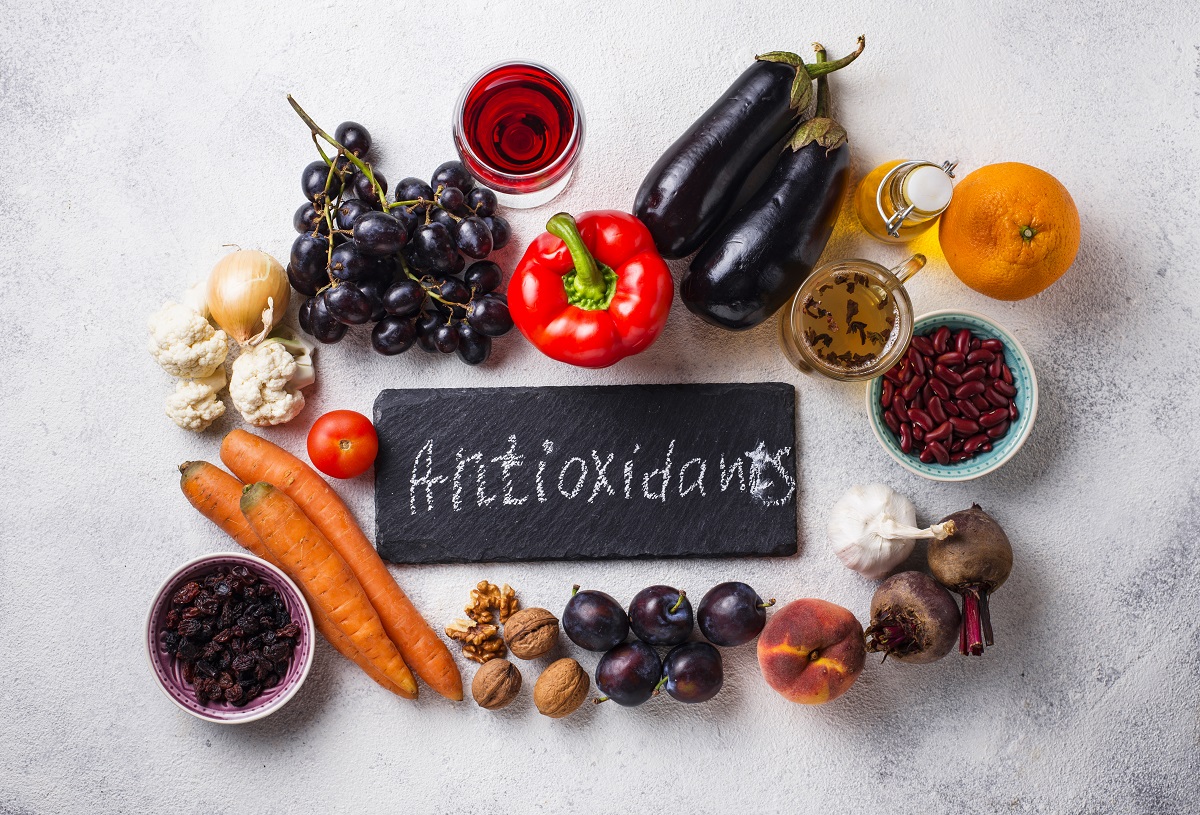What are the health benefits of antioxidants?
- Fights off free radicals
- Lessens oxidative stress
- May promote good mental health
- Protects your eyesight
- Supports healthy aging
When we talk about healthy foods and supplements, there’s a lot of talk about antioxidants. Many experts and respected studies say they protect us from a variety of illnesses and degenerative diseases.
However, many people know what they are and how they work within our bodies. If you’re one of these people, read on — this article covers all the health benefits of antioxidants, and how to add them to your diet.
What are antioxidants?
Antioxidants are chemical substances that prevent or slow down damage to your cells. This damage comes from unstable molecules that your body makes in various reactions, as well as exposure to many environmental stressors — free radicals. Antioxidants are sometimes called “free-radical scavengers” because of this.
There are over a hundred different substances that can be classified as antioxidants. The ones you may be most familiar with are vitamins like vitamin C and E, or minerals like selenium and manganese. Other nutrients, like flavonoids and polyphenols, are naturally occurring substances that have antioxidant capacity.
But how exactly do these substances help your body? Antioxidants offer the following benefits for your health:
Fights off free radicals
First and foremost: they protect your cells from the damage caused by free radicals. These unstable molecules are highly reactive, and seal electrons to stabilize. To do so, they attack cells to steal electrons. These cells become “robbed”, transforming into a free radical themselves. This creates a never-ending chain reaction, which translates into damage to our cells. Enough damage and you’re likely to end up with serious health concerns.
The thing is that you cannot completely remove free radicals — they’re created when you breathe when you eat, and when you move. Environmental factors like smoke and sunlight also promote free radical production. Since they’re impossible to remove, you need an abundance of antioxidants to prevent damage.
Antioxidants do this by providing the electrons free radicals need, without transforming into free radicals themselves. You need a variety of antioxidants to prevent or slow down free radical damage, as different antioxidants have different protective functions against such damage.
If antioxidant levels are low, you do not have the resources to defend against these radicals, leading to harmful oxidative stress.
Lessens oxidative stress

The risk of oxidative stress rises when you lack antioxidants, which leads to inflammation and damage in various parts of the body. Oxidative stress is linked to several conditions, such as cardiovascular disease (atherosclerosis), diabetes, autoimmune disease, neurodegenerative diseases (Alzheimer’s disease, Parkinson’s disease), and many more. And, with these conditions, you’re likely to experience more oxidative stress — creating a vicious cycle.
Antioxidants help ease symptoms of oxidative stress. Certain vitamins can reduce a protein like c-reactive protein (CRP), which is associated with cardiovascular diseases, by up to 25%.
As you can see, your body needs plenty of antioxidants to prevent and repair damage from oxidative stress — and their effects are strong enough to reduce the long-term damage of free radicals.
May promote good mental health
Of all your organs, your brain is the most susceptible to damage from free radicals. The hippocampus in particular may take a big hit from free radicals. This impacts learning and memory functions, as well as reduces the growth of new brain cells. Furthermore, a damaged or inhibited hippocampus is linked to mood disorders like depression.
Some researchers believe that conditions like depression and antioxidants are caused by antioxidant deficiencies. In some studies, adding antioxidant-rich foods to participants’ diets showed reduced depression and anxiety symptoms. Another study showed that levels of certain antioxidants, such as vitamins A, C, and E, were lower in those with mood disorders.
Protects your eyesight

Conditions that cause poor eyesight, like age-related macular degeneration (AMD) are common in older adults. It happens when tissues at the back of your eye — the macula — are worn away, which reduces your field of vision. AMD is the leading cause of poor eyesight and may affect your ability to drive, read, cook, recognize others, among other tasks.
Studies show that antioxidants lower your chances of AMD by a significant amount, while those with AMD may prevent further vision loss. Clinical trials used a combination of vitamin C, E, zinc, and beta carotene in treating patients. The results were positive — the risk of having AMD was reduced by 17% with antioxidant supplementation alone.
Supports healthy aging
Aging, oxidative stress, and inflammation are closely related — many theories suggest that experiencing these things long-term affects several bodily functions, like your immune, nervous, and endocrine systems. This effect worsens as you age, and may lead to an inflammatory state. We know that this creates a vicious circle with free radicals and oxidative stress.
The continuous domino effect between chronic oxidative stress and inflammation will lead to an increased risk of age-related diseases and mortality. Many scientists say that this is the root cause of several age-related conditions, like heart disease and cancer.
Research states that these factors contribute to cellular aging, as poor health is linked to shorter telomeres. These are the ends of chromosomes and protect our DNA. Throughout your life, your cells divide, and these telomeres get shorter. The more your telomeres wear down, the less protected your DNA is, which increases the risk of premature aging and disease. Having an antioxidant-rich diet may help protect your DNA, as antioxidants disrupt the damaging cycle of oxidative stress and free radicals.
Where can I get antioxidants?
There are no blanket solutions for your antioxidant intake — but we recommend a diet that is rich in whole vegetables, fruits, grains, herbs, and extracts of these greens to provide enough of these beneficial nutrients
Drinks that contain rich sources of such greens can serve as an easy and convenient way of upping your antioxidant intake. Bona Vita’s 8-in-1 Organic Coffee is chock-full of Mangosteen, Guyabano, Moringa, and Acai Berry extracts — all of which are antioxidant-rich fruits and vegetables. Drink just one cup a day to receive all of these health benefits, and more!
Key Takeaway
There are many health benefits of antioxidants — they protect you from damaging free radicals and oxidative stress, and prevent serious health conditions even in old age. Such health benefits are backed up by years of peer-reviewed trials and research. They are some of the most important nutrients you should include in your diet — so get some Bona Vita 8-in-1 Organic Coffee today to supplement your antioxidant intake!



